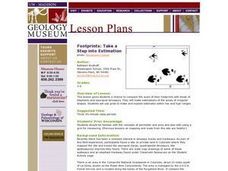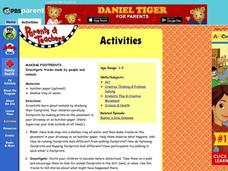Howard Hughes Medical Institute
Human Feet Are Strange
Feet are neat! So, if you've already walked the path of examining animal footprints with your class, put them in the shoes of early humans! A well-designed lesson incorporates video, discussion, and hands-on learning to demonstrate how...
PBS
Print Hints
It would be a crime not to give the lesson a chance! An inquiry-based lesson has pupils assume the role of crime scene investigators as they make observations about shoe prints. They look for patterns in the prints such as distance and...
Chicago Botanic Garden
Reflecting on What I Learned About Climate Change
After three eye-opening lessons about our environment, scholars revisit a 10-question survey, reflect on their new-found knowledge, and take action by writing to a representative or creating a public service announcement about...
Chicago Botanic Garden
Impacts of Climate Change
Scholars become experts on the eight major impacts of climate change through a jigsaw and grand conversation. They then research and present what they learned about effects specific to their region.
Chicago Botanic Garden
Faces of Climate Change
Sometimes, the best solution to a problem can be found by walking in someone else's shoes. Here, scholars use character cards to take on the roles of people around the world. They determine how their character's...
Chicago Botanic Garden
Are You Bigfoot?
Scholars independently explore several websites to calculate their ecological footprint. Using their new found knowledge, they answer six short-answer questions and take part in a grand conversation with their peers about how...
Curated OER
Footprints: Take a Step into Estimation
Compare sizes of student footprints with those of elephants and sauropod dinosaurs! Upper graders make estimations of the areas of irregular shapes; students use grids to make and explain estimates within low and high ranges.
Curated OER
Making Footprints
An interesting way of looking at footprints and tracks. Pupils step into a tray of water, and make footprints of various kinds on butcher paper. They tip toe, run, hop, and walk. Then, they take a close look at the differences between...
Curated OER
Track Traces
Students explore animal characteristics by participating in an animal anatomy activity. In this animal tracks lesson, students identify the differences between specific animals and the shape of their footprints. Students utilize a...
Curated OER
Understanding Biodiversity Via Ecological Footprints
Sixth graders investigate the ways in which human beings impact the environment and ecology through the calculation of their own ecological footprint, discussion questions pertaining to biodiversity and potential imbalance hazards, and...
Curated OER
Fascinating Footprints
In this footprints worksheet, students compare dinosaur prints and human prints. Students compare and draw different prints by answering 7 questions.
Curated OER
Fancy Footwork
In this painting learning exercise, learners remove their shoes and put their feet in a tray of paint. Students paint an abstract painting with their feet. This learning exercise is geared to the adults who will be guiding learners.
Curated OER
Whose Footprints Are They?
In this matching worksheet, students are given illustrations of 5 different types of footprints and 5 different animals. They are asked to draw a line from each footprint to its corresponding animal.
Environmental Education for Kids
Eek!: Follow That Footprint
Have you ever investigated all of those foot prints in the snow? Learn how to track the various creatures in your back yard with this guide.
















